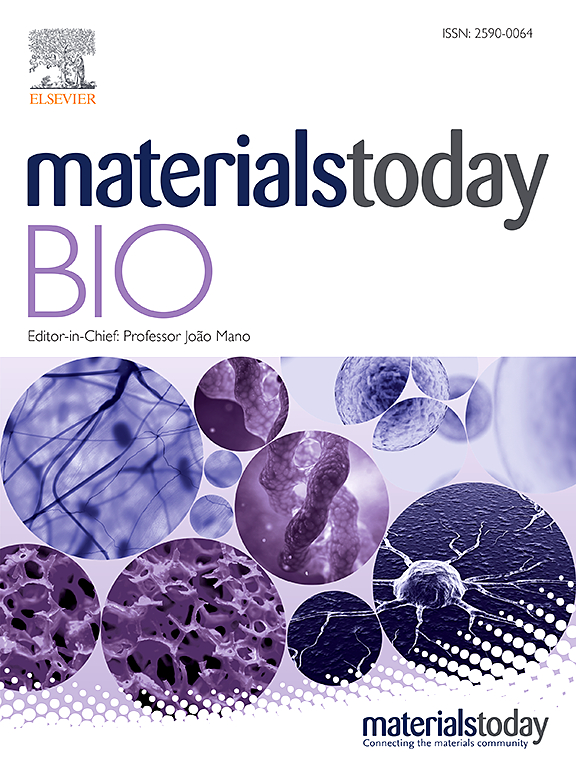Green synthesis of purple sweet potato-derived selenium nanoparticles accelerates wound healing through pyroptosis regulation
IF 10.2
1区 医学
Q1 ENGINEERING, BIOMEDICAL
引用次数: 0
Abstract
Although advances in nanomedicine using nanoparticles (NPs) derived from natural compounds have provided us with much insight into how to recover from wound infections, exploring the wound healing pathway remains a new perspective that has attracted significant interest in addressing wound complications challenges. Here, we harnessed the therapeutic potential of novel selenium nanoparticles (SeNPs) derived from Purple sweet potato (PSp) extracts to promote wound healing through the regulation of pyroptosis-related pathways. PSp-SeNPs, with an average particle size of 80–100 nm, demonstrated significant antibacterial activity against S. aureus and MRSA clinical pathogens. The mechanism involves impairment of bacterial growth, biofilm formation, and metabolic processes through ATP depletion. Moreover, PSp-SeNPs impairs NLRP3-mediated pyroptosis including p-IκBα, p-NF-κB, IL-18, and IL-1β. This regulatory effect decreases inflammatory cytokines IL-6 and TNF-α while promoting angiogenesis and collagen formation through increased expression levels of TGF-β, VEGFA, and CD31, thus accelerating wound healing. In vivo assessments confirmed that PSp-SeNPs significantly enhanced wound healing without adverse effects, indicating their high biocompatibility and bioavailability. This groundbreaking study elucidates the therapeutic potential of PSp-based selenium nanoparticles, facilitating the development of precise and efficient treatment strategies for wound healing and diverse medical applications.

绿色合成紫色红薯衍生的硒纳米颗粒通过焦亡调节加速伤口愈合
虽然纳米医学的进步利用天然化合物衍生的纳米颗粒(NPs)为我们提供了许多关于如何从伤口感染中恢复的见解,但探索伤口愈合途径仍然是一个新的视角,已经吸引了解决伤口并发症挑战的重大兴趣。在这里,我们利用从紫甘薯(PSp)提取物中提取的新型硒纳米颗粒(SeNPs)的治疗潜力,通过调节与焦热相关的途径来促进伤口愈合。ps - senps平均粒径为80 ~ 100 nm,对金黄色葡萄球菌和MRSA临床病原菌具有明显的抗菌活性。其机制涉及细菌生长、生物膜形成和通过ATP耗竭的代谢过程的损害。此外,PSp-SeNPs损害nlrp3介导的焦亡,包括p- i -κB α、p-NF-κB、IL-18和IL-1β。这种调节作用降低炎症因子IL-6和TNF-α,同时通过提高TGF-β、VEGFA和CD31的表达水平促进血管生成和胶原形成,从而加速创面愈合。体内评估证实,PSp-SeNPs显著促进伤口愈合,无不良反应,表明其具有高生物相容性和生物利用度。这项开创性的研究阐明了基于psp的硒纳米颗粒的治疗潜力,促进了伤口愈合和各种医疗应用的精确和有效治疗策略的发展。
本文章由计算机程序翻译,如有差异,请以英文原文为准。
求助全文
约1分钟内获得全文
求助全文
来源期刊

Materials Today Bio
Multiple-
CiteScore
8.30
自引率
4.90%
发文量
303
审稿时长
30 days
期刊介绍:
Materials Today Bio is a multidisciplinary journal that specializes in the intersection between biology and materials science, chemistry, physics, engineering, and medicine. It covers various aspects such as the design and assembly of new structures, their interaction with biological systems, functionalization, bioimaging, therapies, and diagnostics in healthcare. The journal aims to showcase the most significant advancements and discoveries in this field. As part of the Materials Today family, Materials Today Bio provides rigorous peer review, quick decision-making, and high visibility for authors. It is indexed in Scopus, PubMed Central, Emerging Sources, Citation Index (ESCI), and Directory of Open Access Journals (DOAJ).
 求助内容:
求助内容: 应助结果提醒方式:
应助结果提醒方式:


